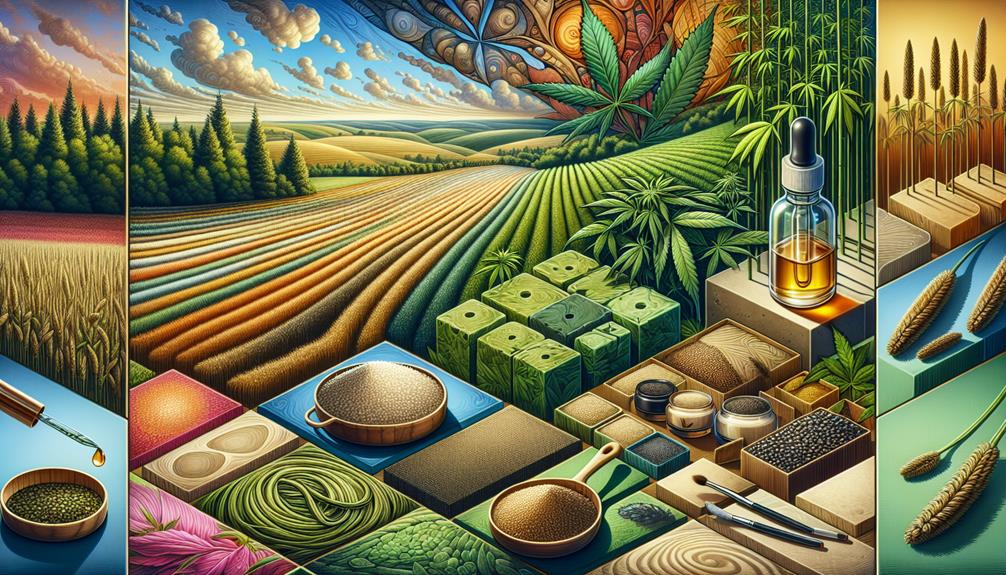I've found that hemp is a real jack-of-all-trades plant. It's used for making durable textiles like clothes and ropes, thanks to its strong fibers. Hemp seeds are super nutritious too—they're packed with proteins, vitamins, and omega fatty acids, making them great for health foods and supplements. People even use hemp oil for skin care and pain relief because it has awesome moisturizing and anti-inflammatory properties. Plus, hemp is pretty eco-friendly. It grows with minimal pesticides, helps prevent soil erosion, and its products are biodegradable. There's so much more to discover about this versatile plant.
Table of Contents
Key Takeaways
- Hemp is used in textile production for making durable, breathable, and eco-friendly fabrics.
- Extracted hemp oil is utilized for its nutritional and skin-health benefits.
- Hemp seeds are consumed for their high nutritional value, including proteins, omega fatty acids, and fibers.
- In sustainable agriculture, hemp contributes to soil regeneration and requires fewer pesticides.
- Hemp is incorporated into eco-friendly products like biocomposite plastics and building materials like Hempcrete.
Historical Uses of Hemp
Hemp has been a go-to material for making strong textiles, paper, and ropes for thousands of years. This plant's history is incredibly rich, tracing back to ancient civilizations like China and Egypt, where it was revered not just for its practical uses but also for its medicinal properties. The fiber from hemp is incredibly durable, which made it ideal for shipbuilding—think sails and rigging that wouldn't rot easily in the damp, salty air.
Hemp seeds have also played a crucial role throughout history. They're packed with essential nutrients and proteins, making them an important food source. Plus, the oil extracted from these seeds has been used in both cooking and as a base for various medicinal preparations. It's fascinating how this one plant could offer so much—food, medicine, and strong materials.
Understanding hemp's ancient applications helps us appreciate its versatility and sustainability. From feeding and healing to building some of the basic tools of ancient navigation, hemp's contributions to early technological and health advancements are undeniable. It's not just about the fibers used in textiles; it's about a holistic approach to using natural resources.
Hemp in Textile Production
Now, let's talk about hemp in textile production.
I'll start by exploring the unique properties of hemp fabric, like its durability and breathability.
Then, we'll look at how sustainable farming practices for hemp affect the environment and touch on the latest trends in the textile market.
Hemp Fabric Properties
Exploring the properties of hemp fabric reveals its remarkable durability, breathability, and eco-friendly nature, making it a standout choice for textile production. Hemp fabric's durability means it can withstand plenty of wear and tear. Its breathability makes it perfect for clothing that needs to stay fresh and comfortable, even in hot weather. I've found its antimicrobial properties particularly impressive as they help prevent odors and bacterial growth, making it ideal for active wear.
Moreover, hemp is mold resistant and holds up well against UV light, which is great for outdoor gear. It's also eco-friendly, requiring less water and fewer pesticides. Being versatile, hemp can be blended with other fibers like cotton or silk, enhancing fabric qualities and expanding its use in various textile applications.
Sustainable Farming Practices
After discussing hemp fabric's properties, let's look at how its cultivation impacts sustainable agriculture in textile production. Hemp is quite a champ in sustainable farming practices, particularly in textile production. It naturally resists pests, slashing the need for harsh pesticides. This is a big plus for keeping our environment cleaner.
Moreover, hemp's deep roots are great for the soil, aiding in soil regeneration and preventing erosion. As for the products, hemp textiles aren't only biodegradable but also recyclable, which means they leave a minimal footprint on our planet.
The versatility of hemp extends across various products like clothing and home textiles, making it a top pick for those of us aiming for a greener lifestyle.
Textile Market Trends
Hemp is making big waves in the textile industry with its strong, sustainable fibers. As I delve deeper into the role of hemp in textile production, it's clear that the global market is responding well. Consumers and brands are leaning towards more eco-friendly products, and hemp textiles fit the bill perfectly. They're not just sustainable; they're also biodegradable, which means they play a huge part in reducing our environmental footprint.
Here's what makes hemp stand out in the textile industry:
- Fabric properties: Breathable, moisture-wicking, and UV resistant
- Versatile textures: From smooth and soft to robust and textured
- Eco-friendly: Biodegradable and aligns with sustainable fashion trends
I'm witnessing a significant shift towards sustainability, and hemp is at the forefront.
Nutritional Value of Hemp Seeds
I'll start by diving into the impressive nutritional benefits of hemp seeds. Did you know that hemp seeds contain a serious punch when it comes to nutrients critical for our health? First off, they're packed with omega-3 fatty acids, which are champs for heart health. They don't just stop there; these tiny seeds are a powerhouse of essential amino acids, making them a complete protein source, something quite rare in the plant kingdom.
Beyond building muscles, these seeds are brimming with vitamins and minerals. We're talking magnesium, vitamins C, B, A, and E—all essential for maintaining a healthy body. If you're dealing with inflammation, adding hemp seeds to your diet might help. They've properties that could reduce inflammation, making them great for managing chronic inflammation conditions.
Lastly, let's talk digestion and gut health. Hemp seeds offer both soluble and insoluble fiber, aiding in digestion and promoting a healthy gut. This can lead to better overall health and even prevent some digestive issues. So, incorporating hemp seeds into your diet isn't just good; it's beneficial in multiple ways, making it a smart choice for anyone looking to boost their nutritional intake.
Hemp Oil Benefits
Now, let's talk about what hemp oil can do for us.
It's great for enhancing skin health, supports our heart, and even helps with pain and inflammation.
These benefits make hemp oil a must-try for those looking to improve their well-being.
Skin Health Enhancement
Let's dive into how hemp oil can boost your skin's health. Packed with benefits, hemp oil is a game-changer for anyone looking to enhance their skincare routine. Here's why it's so great:
- Antioxidant Power: Hemp oil, rich in vitamin E, helps protect your skin from environmental damage by neutralizing free radicals.
- Deep Moisturization: The fatty acids in hemp oil, including omega-3 and omega-6, deeply nourish and moisturize the skin, leaving it soft and radiant.
- Soothing Properties: Thanks to its anti-inflammatory effects, hemp oil can calm skin conditions like acne and eczema, promoting a clearer and smoother complexion.
Using hemp oil can really step up your skin health game, whether you're fighting dryness or looking for that glow.
Cardiovascular Support
Hemp oil's rich content of omega-3 and omega-6 fatty acids makes it a powerful ally in supporting cardiovascular health. These fatty acids are crucial because they help reduce the risk of heart disease.
What's more, the gamma-linolenic acid (GLA) in hemp oil not only supports overall heart health but also offers a range of other health benefits.
Additionally, hemp oil is packed with vitamin E, a potent antioxidant that protects your heart by combating harmful free radicals in your body.
Regular intake of hemp oil can significantly bolster your cardiovascular function, thanks to these components. So, incorporating hemp oil into your diet might be a smart move if you're looking to keep your heart in tip-top shape.
Pain and Inflammation Relief
I've found that using hemp oil can significantly alleviate pain and reduce inflammation, especially in conditions like arthritis. The cannabinoids, particularly CBD, in hemp oil interact with the endocannabinoid system, helping regulate pain and curb inflammation. Here's how it's been helping me:
- Endocannabinoid System Interaction: CBD's impact on this system helps alter pain signals in my body.
- Rich in Fatty Acids: Omega-3 and omega-6 in hemp oil contribute to its anti-inflammatory properties, easing my joint pain.
- Natural Alternative: It offers a more natural solution for chronic pain management without the harsh side effects of typical pain medications.
CBD Extraction and Applications
CBD is extracted from hemp primarily for its health benefits, without the high. The process, known as CBD extraction, taps into the rich potential of unpollinated female flowers, which boast the highest concentration of cannabinoids. Growers often use feminized hemp seeds to ensure that these plants are predominantly female, maximizing the yield of CBD-rich extract.
The therapeutic effects of CBD are well-documented, making it a sought-after component for various medicinal applications. It's completely legal as long as the THC levels are controlled, ensuring no psychoactive effects are present. This legality opens up a wide range of possibilities for using CBD in health and wellness products.
Here's a quick glimpse at the key aspects of CBD extraction and its benefits:
| Feature | Benefit |
|---|---|
| Controlled THC levels | Legal use in various products, no high |
| Feminized hemp seeds | Higher CBD production from female flowers |
| Medicinal benefits | Relief from pain, anxiety, and inflammation |
Hemp in Eco-Friendly Products
Why are eco-conscious consumers turning to hemp-based products? It's simple: hemp offers a plethora of eco-friendly solutions that align perfectly with a sustainable lifestyle. As I've explored the uses of hemp, it's clear that its versatility in eco-friendly products is unmatched, from building materials to biofuels.
Here's a quick snapshot of how hemp is making waves in sustainable products:
- Biocomposite Plastics: Hemp fibers are revolutionizing the plastics industry by replacing synthetic materials in composites. This not only reduces environmental impact but also enhances the durability of products.
- Building Materials and Insulation: Hempcrete, crafted from hemp fibers and lime, serves as a sustainable alternative to traditional concrete. Its insulating properties are ideal for eco-conscious construction projects.
- Biofuel Production: Utilizing hemp biomass for biofuel production presents a renewable energy source that significantly lowers the carbon footprint compared to fossil fuels.
Hemp's role in eco-friendly products isn't just impressive; it's essential for pushing us towards a greener economy. By integrating hemp into various products, we're not only utilizing a sustainable resource but also promoting environmental stewardship and reducing our reliance on non-renewable materials.
Hemp in Animal Feed
Increasingly, hemp is becoming a popular choice for animal feed due to its high nutritional value and eco-friendly benefits. As I've learned, using hemp in animal feed isn't just a trend; it's backed by its robust nutritional profile. This plant offers high-quality protein, which is crucial for the healthy growth and maintenance of livestock and pets. What's more, it's packed with all the essential amino acids animals need, which isn't always the case with plant-based proteins.
Hemp also delivers a healthy dose of omega-3 and omega-6 fatty acids. These aren't just good for us humans—they play a vital role in animal health too, aiding everything from immune function to smooth and shiny coats. Plus, the fiber content in hemp helps with digestion, keeping animals' gut health on track.
What really ties it all together for me is how sustainable and eco-friendly hemp is as an option for animal feed. It promotes a more natural diet and integrates seamlessly into an eco-conscious lifestyle. By choosing hemp-based feed, you're not just feeding animals; you're also supporting sustainable agricultural practices. It's a win-win situation in my book.
Regulatory Landscape for Hemp
While we've explored how hemp benefits animal health and sustainability, it's also important to understand the regulations governing its use. The regulatory landscape for hemp is shaped significantly by both federal and state levels, especially since the legalization of commercial hemp production under the 2018 Farm Bill. This pivotal bill defines hemp as having a THC content below 0.3%, setting the standard for legal cultivation.
Navigating the regulations can be quite a task, so let's break it down:
- Farm Bill Compliance: Ensures that hemp production adheres to the THC threshold, a crucial factor for legality.
- State Regulations: Each state has its own set of rules, like Wisconsin, which recently aligned its program with USDA guidelines.
- Cultivation Practices: Growers must register and follow specific guidelines that may change annually, impacting how they plant, grow, and harvest hemp.
For any hemp producer, staying in compliance with these regulations isn't just about legality; it's about thriving in an evolving industry. Understanding these rules helps in aligning cultivation practices with legal standards, ensuring that the benefits of hemp can be fully realized without legal hurdles.
Frequently Asked Questions
What Does Hemp Do to the Human Body?
Hemp affects my body by interacting with my endocannabinoid system, influencing pain, mood, and sleep. It's cannabinoids like CBD reduce inflammation and pain, potentially improving my overall well-being and health.
What Are the Main Uses of Hemp?
Hemp's main uses include making textiles, papers, and biodegradable plastics. It's also great for producing CBD oils, which many people use for health benefits. Plus, its seeds are nutritious and versatile in cooking.
Is Hemp and Marijuanas the Same?
No, hemp and marijuana aren't the same. They're both cannabis plants, but hemp has low THC and is used industrially, while marijuana has higher THC and is used medicinally or recreationally.
Is Hemp Safe for Humans?
I've found that hemp is generally safe for adults to use for up to six months. However, there's less info on its safety for pregnant women, kids, and those allergic to cannabis.
- Where Does Hemp Come From? - April 22, 2024
- Why Do People Eat Hemp? - April 22, 2024
- Is Hemp Safe for Humans? - April 22, 2024








